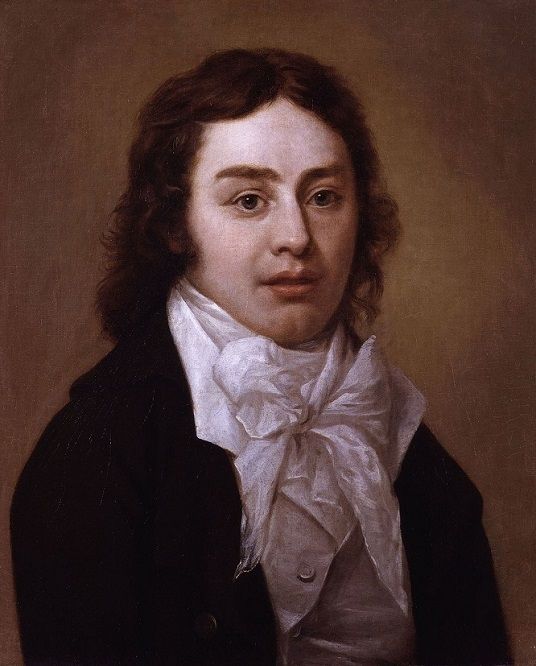Samuel Coleridge's fate
Samuel Coleridge is born in the family of a pastor from County Devonshire, who is both a teacher of local rural children. As a teenager he extremely study, he reads with feverish jealousy to satisfy the urges of his deeply emotional soul. After his first youthful disappointment in love, he left for London. In 1794, he settled in Cambridge, where he study the socially political doctrines. Then he moved to Oxford, where he became close to South, the third talented poet of the lake, who worked in England at the dawn of Romanticism. In front of him, he puts forward his project for the establishment of a "Pancracratic Academy". In the last semester of his studies in Oxford he wrote with South Africa the historical drama in three acts "The Fall of Robespierre."
In 1795 he married and settled in Somerset County, where Wordsworth arrived and became a neighbor with whom he quickly became friends. Thanks to the benefits of the local administration, he managed to survive. After receiving solid monetary support from the wealthy Thomas Thompson, he has the opportunity to devote himself quietly to the realization of his literary projects. In 1796 he created the collection "Poems on Different Themes" and "Oda for the Year". He started writing the Kristelbel poem and developed the poem project entitled "Kubla Khan". He worked long over these works, worked on them several times and published them only in 1816. Meanwhile, he devoted himself entirely to religion and became a pastor of the Shrewsbury Unity Church. At the same time, the well-known English producers of porcelain, the Wajdeu brothers granted Coleridge a lifetime rent, provided that they will devote themselves entirely to the cultivation of their poetic talent. Thanks to William Wordsworth entrepreneurship, the project for the lyrical ballads, in which the poet Coleridge took part with passionate dedication, became known as the author of The Old Man's Ballad, The Tale of the Mistress and The Slave (1798). In the same year, he published a volume of poems including "Anxiety in Loneliness", "France", "Oda" and "Frost at midnight". In 1798 he left for Germany, where he remained for a year, studying the philosophy and poetry of this country, which was extremely important for his formation as a highly educated poet education period. Upon his return, he rebuilds his friendly relations with Wordsworth and South Africa and goes to the editorial office of the authoritative London Morning Post newspaper. In 1800, he worked on translating the historical dramatic trilogy of Schiller Wallenstein. Meanwhile, it suffers from an incurable disease accompanied by painful physical pain.
The Suicide's Argument
by Samuel Coleridge
Ere the birth of my life, if I wished it or no
No question was asked me--it could not be so !
If the life was the question, a thing sent to try
And to live on be YES; what can NO be ? to die.
NATURE'S ANSWER
Is't returned, as 'twas sent ? Is't no worse for the wear ?
Think first, what you ARE ! Call to mind what you WERE !
I gave you innocence, I gave you hope,
Gave health, and genius, and an ample scope,
Return you me guilt, lethargy, despair ?
Make out the invent'ry ; inspect, compare !
Then die--if die you dare !
To ease the continuous attacks, the disease begins to swallow an increasing amount of opium. In the hope of reassuring his constant pain he went to Malta (1804), whose soft Mediterranean climate was beneficial to him. He stays there for a year, then wanders through Italy, where he lives longer in Rome. In 1806 he returned to England. His marriage has already failed and he has settled in Grasmere, where his faithful friend Wordsworth lives. n the following years, he began to publish the Philosophy and Theology magazine "The Friend", achieved success on the stage as the author of the drama "Remorse of Conscience", affirming his authoritativeness of a versatile erudite with Biographia Literaria - autobiographical fragments and reflections on Wordsworth's theory of poetry, and the ideas of German philosophers whose work he had learned during his one-year stay in Germany. Completely abandoned by his wife and children, Coleridge manages to conquer a new protector and generous sponsor, surgeon physician John Gilman, who shelters him at his home in Highgate and tries to save him from his painful addiction to opium. For the rest of his life, he struggles with the buoyant power of the drug, perceives the healing position of an omniscient sage, becomes known among the young English philosophers called "The Oracle of Haggate," conquers the authority of a patriarch around whom a school of zealous followers is formed. After his recent works, we should note his treatises "Helpers in the Reflection" and "The Establishment of the Church and the State" . After his death, there appeared "Conversations" and "Anima Poetae" - a collection of aphorisms.
The imagination of the poet is tempted to reproduce the strange metamorphoses of the forms that are created by the changes in ideas. Coleridge's poetic world is stirred by the crises of despair, the compulsive, tempting, thought of the crime, the remorse caused by the admitted voluntary or unwilling sin. He is constantly burdened by the anguish of separation and the risks of wandering and wandering. Coleridge has been honored by some historians of European poetry as a precursor to expressive lyricism, as his fantasy is often attracted by insurrectional situations situated at the boundary between the real and the imaginary world.

You got a 6.75% upvote from @postpromoter courtesy of @godflesh!
Want to promote your posts too? Check out the Steem Bot Tracker website for more info. If you would like to support the development of @postpromoter and the bot tracker please vote for @yabapmatt for witness!